- Home
- S. D. Perry
Star Trek: Terok Nor 02: Night of the Wolves
Star Trek: Terok Nor 02: Night of the Wolves Read online
“What the kosst?” said a man’s voice from somewhere back the way she had come. Someone else was here. Someone Bajoran, apparently, for the curse was not one that a Cardassian would ever use. Ro Laren drew her phaser, more excited than afraid.
“Who are you?” she shouted.
“Who am I?” the voice answered. “Who are you? This heap is mine—we claimed it over a week ago.”
A man emerged in the corridor then, a gray-haired Bajoran that Laren didn’t recognize.
She lifted her phaser. “Don’t make me ask again,” she said coolly.
He slitted his eyes at her, his heavily lined face crinkling with the expression. He looked worried for an instant, but then smiled. “My name is Darrah Mace,” he told her. “I’ve come here from Valo II. Now, how about you tell me who you are?”
“My cell found this ship two days ago,” she told him, her phaser still trained on the stranger. “I was here first.”
The man laughed. “Just how old are you? Twelve? You still haven’t told me your name, by the way.”
“I’m Ro,” she said firmly, hearing the sound of the airlock starting to open. “And that will be Bram, the leader of my cell. It’s two against one now, so you’d better shove off. This ship is ours.” Laren stood her ground, her phaser still pointed directly at Mace’s head.
“And just what do you propose to do with that?” The man smirked, folding his arms in a self-satisfied expression that infuriated her.
“Didn’t you hear me? I said shove off.” She indicated her phaser. “This thing’s stun setting is broken, but the rest of it works just fine.”
Twelve! She’d been fourteen for better than two months.
This book is a work of fiction. Names, characters, places, and incidents either are products of the authors’ imaginations or are used fictitiously. Any resemblance to actual events or locales or persons, living or dead, is entirely coincidental.
™, ® and © 2008 by CBS Studios Inc. All Rights Reserved. STAR TREK and related marks are trademarks of CBS Studios Inc.
CBS, the CBS EYE logo, and related marks are trademarks of CBS Broadcasting Inc. ™ & © CBS Broadcasting Inc. All Rights Reserved.
This book is published by Pocket Books, a division of Simon & Schuster, Inc., under exclusive license from CBS Studios Inc.
All rights reserved, including the right to reproduce this book or portions thereof in any form whatsoever. For information address Pocket Books Subsidiary Rights Department, 1230 Avenue of the Americas, New York, NY 10020
POCKET and colophon are registered trademarks of Simon & Schuster, Inc.
ISBN-13: 978-1-4165-9177-1
ISBN-10: 1-4165-9177-X
http://www.SimonSays.com/startrek
http://www.StarTrek.com
For Thad
Sorry I was such a jerk during rewrites
—B. D.
For Myk and the boys
—S. D. P.
Acknowledgments
Britta Dennison would like to thank the following people for valuable creative or technical input:
Thad Dennison, Ben Burdett, Lucy Dennison, and a nod to Hans Lindauer. Thanks to James Swallow for raising the bar so high. Also, a massive thanks to Paula Block and Marco Palmieri for laying the framework and for taking a chance on me. I hope the gamble pays off.
For their emotional support:
My husband, Thad; my parents, Ben Burdett and Barbara Burdett; my sibs, Brooke Minas, Barbi Buresh, and Brady Burdett; the in-laws and baby-sitters extraordinaire, Judy Dennison and Annete Levy; also: Mike and Frani Grover and the rest of the Grover clan, all the mooks who read my blog, and Lucy and Ruth Dennison, for keeping me on my toes.
Extra super special thanks goes out to my BFF S. D. Perry, who has been a valuable mentor and invaluable friend.
S. D. Perry also thanks Paula Block and Marco Palmieri, James Swallow, and all the Trek writers, past and present; her marvelous husband, two perfect kids, and the lovely ladies at the School of Autism who keep the faith. Oh, and Britta, who’s way, way cooler than she thinks she is, and also came up with all the really interesting parts.
OCCUPATION YEAR EIGHTEEN
2345 (Terran Calendar)
Prologue
The Bajoran vessel fled into the Denorios Belt, chasing salvation it would never find.
Malyn Ocett fought the involuntary curling of her lips as the tiny ship tried to evade her; there was opportunity here, but also peril. As a newly minted dalin assigned to captain the Cardassian scoutship Kevalu on her first patrol of the B’hava’el system, this was exactly the chance she needed to prove herself worthy of the command that had been only grudgingly entrusted to her. But failure to stop the errant Bajoran craft would validate those who had opposed her assignment—and Ocett knew she had no shortage of detractors in the military—effectively ending her career before it could even begin.
And that I will not allow.
“Close the distance, helm,” she said aloud. “Communications, open a channel.”
“Target is receiving us, Dalin.”
“Bajoran vessel. This is the Union scoutship Kevalu. You are in breach of travel restrictions. I give you opportunity to turn back and surrender to Cardassian authority or I will be forced to take action.”
Silence answered her.
“They’re increasing speed,” her pilot said.
“Stay with them.” The Kevalu vibrated as it pierced the Denorios Belt, a tempestuous ring of charged plasma that encircled Bajor’s star between the orbits of the seventh and eighth planets. Normally avoided by spacecraft as a navigation hazard, the Belt had in recent years become the obvious first destination for Bajorans foolish enough to attempt illicit travel out of their home system.
“Bajoran vessel. This insolence will not be tolerated. Power down immediately or I will open fire.”
The alarming rise in terrorism since the start of the annexation had forced the enactment of strict regulations over space travel, which in the B’hava’el system was generally limited to Cardassian vessels and occasional trade ships from other worlds. Bajorans, by contrast, were forbidden to leave their planet without express authorization, and only under the most controlled conditions. But they were a surprisingly crafty and devious people, Ocett had quickly learned, capable and even determined to find gaps in the Cardassian security web through which they could slip. Under different circumstances, a ship caught in such an act would be destroyed immediately, but patrols were under strict orders to take prisoners whenever feasible; it was believed by some in Central Command that the capture and interrogation of terrorists would allow the Cardassians to obtain intelligence they could use to break the insurgency.
Still no answer from the Bajoran ship. The gil manning sensors reported that the vessel was preparing to go to warp.
Ocett tended to believe the Bajorans were nowhere near as organized as Central Command seemed to think. The randomness and utter lack of sophistication exhibited by the insurgents spoke to scattered and unaffiliated groups, not a network. But orders were orders.
“Tactical, power up disruptors and target their stardrive,” she said. “Send them a warning shot—I want them disabled, not destroyed.”
“Target acquired. Firing disruptors.”
Ocett watched in satisfaction as light blossomed on the engine case of the oblong vessel’s aft hull. “Direct hit,” the tac officer reported unnecessarily. “Bajoran’s stardrive is off line. However—”
The Kevalu shook against the impact of a particle beam. At first, Ocett wasn’t sure whether to be angry or amused, but the tac officer’s next frantic report put any notions of laughter out of her mind.
Ocett’s eyes widened as she leapt to her feet. “Fire at will! Helm, hard about!”
Letting fly with another salvo from its disruptors, the Kevalu pivoted to port, turning its exposed bow away from its quarry. Explosions ripped open the Bajoran vessel’s hull and the ship broke in half, sending debris luminescing through the plasma field.
Ocett let out a breath. She was a little rattled; the confrontation had not gone at all as she’d expected. The Bajoran ship had been underpowered and should have been no match for the Kevalu.
She whirled angrily upon the tac officer. “What happened, Glinn?”
The young man swallowed. “It was the Denorios Belt, Dalin. Our shields were already taxed protecting us from the plasma field. Taking a direct hit on top of that overloaded the forward emitters. Perhaps if we had not—”
“This is a Union vessel!” Ocett snapped, cutting off whatever impertinent suggestion the glinn was about to make. “More than that, it is a Union vessel under my command, and I will tolerate no incompetence from its crew. You and the chief of engineering will begin work immediately to upgrade our shield emitters so that this unacceptable system failure never happens again. Do you understand me, Glinn?”
“Y-yes, Dalin,” the tac officer stammered. “Permission to leave the bridge?”
“Get out of my sight.”
Ocett waited until the glinn had departed, then discreetly exhaled again. “Helm,” she said as she retook her seat. “Take us out of the plasma field and resume original heading.”
The Kevalu bucked gently as it maneuvered through the Denorios Belt, and Ocett considered how narrowly she had escaped humiliation. Her failure to capture the Bajorans was galling, but at least their vessel had been stopped, and damage to the Kevalu itself was minimal. Still, she was acutely cognizant of the fact that any misstep in her early years as a shipmaster was potentially one from which she would never recover.
It was an unusual choice for a woman to join the military; few ever did so, tending to pursue more traditional careers in the judiciary or the sciences. Most personnel in those professions could remain close to home, be with their families. But since Ocett was unable to have children, it was unlikely that she would ever find a permanent mate. Family was the highest ideal in Cardassian society, and a woman who could not bear children was considered undesirable. Ocett knew that many women in her position would have been bitter, considering themselves condemned to a life of solitude. But Ocett had perceived her situation as an opportunity for a career that would otherwise be closed to her. She had the freedom to travel as far away and as often as the military required, and she had no familial obligations to keep her from dangerous duty. But she was still a rarity. It spite of her recent promotion, none of her crew seemed able to forget it—a situation that required constant reminders, in no uncertain terms, of her absolute authority aboard the Kevalu.
It was with that thought that the gil at sensors, a male named Veda, spoke up. “Dalin, I’m picking up something unusual on midrange scanners.”
“Less preamble, Gil.”
“Yes, Dalin. It’s an object in the plasma fields, about the size of a cargo container. Refined metal, and a faint power signature.”
“Something from the Bajoran ship?”
“Negative. It’s too far from the debris field, and the metallurgy is inconsistent with anything produced by Bajorans or Cardassians.”
Ocett rose and went to the sensor station to see the readings for herself. What she saw gave her pause. Veda had definitely understated the matter: the ship’s database seemed not to know what to make of the object, as apparently nothing like it had ever been recorded by a Cardassian vessel. And there was something else.
“This reading here,” she said, indicating a specific segment of the datastream, “what is it?”
The gil frowned, apparently seeing it for the first time. “I’m not sure.”
Ocett sighed. “Enhance your scan and report,” she ordered. Men. No head for the sciences. It’s a defect of the sex—not inquisitive enough.
While she waited for Veda’s report, she considered her options. All things being equal, she would prefer not to have to interrupt her patrol to investigate an anomalous object, particularly one within the proven hazards of the Denorios Belt. But of course all things were not equal. Since the ship’s automated logs would show that something had tripped the midrange sensors during its patrol, it would be inadvisable to ignore the object. She could file a report of the discovery, but since she wholly expected her superiors to pay significantly more attention to her reports than to any of the men’s, she knew that if she overlooked a single thing, it would invite questions regarding her prudence. Her last option would be to beam the object aboard and conduct a proper analysis. She would almost certainly be accused of being overly zealous if she were to do that, but she felt it was favorable to the alternative—carelessness earned rebuke, especially for a female.
Veda made a puzzled sound. “Well?” Ocett said expectantly.
“Perhaps you should look at this yourself, Dalin.”
Ocett’s eyes narrowed as she leaned in. She arched an eyeridge. “There’s a small fluid mass suspended in the center of the object,” she said aloud, failing to disguise the surprise in her voice.
That caught the pilot’s attention. “Some kind of weapon, then,” he volunteered. “A volatile compound, or a biogenic device.”
“No, I don’t think so,” Ocett said. “It’s not exhibiting the properties normally associated with such materials. It’s almost as if…” She looked up at the pilot. “Helm, take us within transport range of the object, speed one-quarter impulse.”
“Dalin—?” the pilot began, but then reconsidered whatever he was about to say against Ocett’s withering glare. “Acknowledged. One-quarter impulse.”
Ocett pressed her comcuff and alerted the engineer in transport. “Gil Kretech, this is Dalin Ocett. Sensors have registered a small object of unknown composition. As soon as we’re within range, you’re to beam this object directly to the decon chamber so that it can be scanned and logged into the ship’s database.”
Her request was met with a brief pause. “Dalin, if I may say so, our mission is not one of exploration. We are not a science vessel. I recognize that curiosity is a uniquely feminine trait, but—”
Ocett cut him off swiftly. Males never had to tolerate such impudence. “I would advise you to forget my sex and carry out my orders, Gil,” she snapped.
His answer held the appropriate measure of meekness. “I will report back to you as soon as transport is complete, Dalin.”
“See that you do. Bridge out.”
Twenty metrics later, Ocett and Veda stood before the decontamination lab’s observation window while the gil deftly manipulated the remote instruments that were separating the object into its constituent parts: an unadorned, roughly cylindrical capsule that turned out to be a stasis apparatus of some kind, and a small spherical module. But while the alien technology was of considerable interest, it was the contents of the sphere to which Veda directed Ocett’s attention.
“There’s nothing like it in the database, just like the container,” Veda said as he studied the results of his new scans, which were flashing before them on the window as he worked. “But there’s no question that your suspicion about the reading was correct, Dalin. The liquid is organic.”
“Organic,” Ocett repeated. She looked to the transparent sphere and considered its contents—a small quantity of amber hued liquid with the consistency of dark kanar, shimmering subtly in the artificial lights. She could not tear her eyes away for a moment, trying to determine—did she just see a ripple? A slight movement? Or was it only the effect of the containment field? “Is it—?”
“It’s inconclusive. But some of the scans suggest that this substance could be—or maybe could have once been—some kind of life-form.”
Ocett was pleased, for it seemed that she’d chosen wisely. Evidently they’d come across something of interest, after all. No one would complain if it proved valuable.
“Continue your analysis,” she said, her tone cool. “We’ll turn the substance and your findings over to the science team stationed on Bajor after we return to base.”
“Yes, Dalin.”
Smiling to herself as she made her way back to the bridge, Ocett was gratified to finally hear a touch of genuine respect in the gil’s quick reply.
OCCUPATION YEAR NINETEEN
2346 (Terran Calendar)
1
They stood at the apex of the Janitza mountain range in the northernmost sector of the continent, the humid, cold air heavy with the scents of pine and nyawood trees. ThirdTier Gil Corat Damar turned to take in the verdant abundance all around, then turned again, his expression a mix of hunger and awe. The new prefect of Bajor stood behind the junior officer, watching, remembering the first time he’d seen Bajor for himself. He’d been a much younger man then, blinking around himself in wonder.
From their vantage point, the valleys far below were patched over with ovals of colorful farmland, fading into wild tangles of jungle and jagged forests. The shadows of moving clouds cast a traveling pallor along the hilly meadows, disappearing where the densely woven carpet of trees appeared almost black.
Dukat could plainly see Damar’s thoughts as he took in the scenery; in his most lavish dreams, Damar could not have imagined a world like this. It was so far a cry from the cracked and sandy plains of their homeworld, with its hot, erose mountains of obsidian jutting from the barren land. Cardassian soil was good for little more than harvesting rocks, or fashioning into clay for making brittle pots. To see this bold illustration of color, of green and blue and rich red dirt, was quite literally breathtaking.

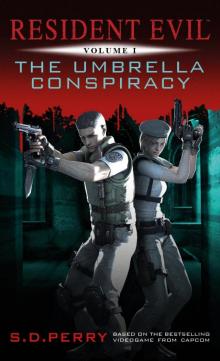 The Umbrella Conspiracy
The Umbrella Conspiracy Zero Hour
Zero Hour Caliban Cove
Caliban Cove Code: Veronica
Code: Veronica Nemesis
Nemesis Underworld
Underworld The Summer Man
The Summer Man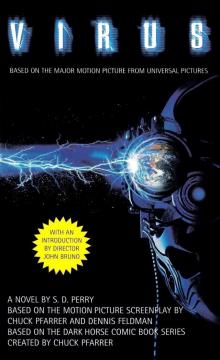 Virus
Virus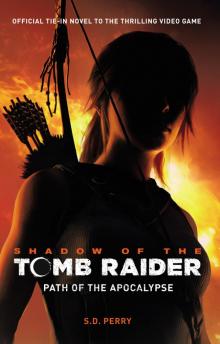 Shadow of the Tomb Raider--Path of the Apocalypse
Shadow of the Tomb Raider--Path of the Apocalypse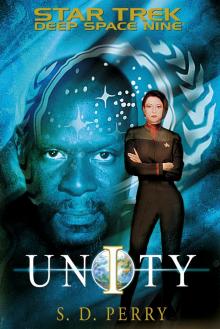 Unity
Unity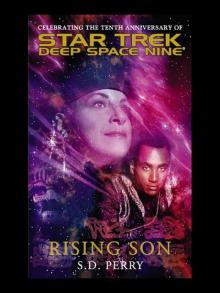 Rising Son
Rising Son Resident Evil: Underworld
Resident Evil: Underworld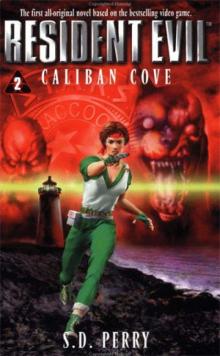 Resident Evil – Caliban Cove
Resident Evil – Caliban Cove Resident Evil – Nemesis
Resident Evil – Nemesis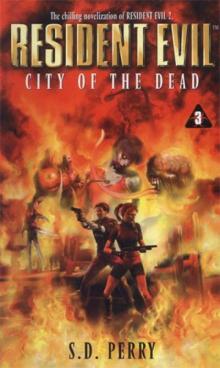 Resident Evil – City of the Dead
Resident Evil – City of the Dead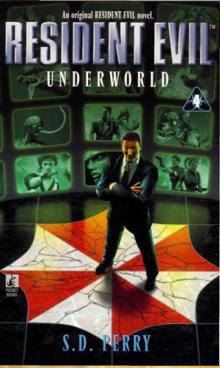 Resident Evil – Underworld
Resident Evil – Underworld Star Trek: Terok Nor 03: Dawn of the Eagles
Star Trek: Terok Nor 03: Dawn of the Eagles Twist of Faith
Twist of Faith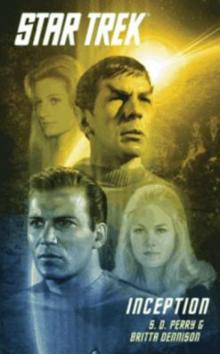 Star Trek: Inception
Star Trek: Inception Cloak
Cloak Resident Evil
Resident Evil Star Trek - TOS - Section 31 - Cloak
Star Trek - TOS - Section 31 - Cloak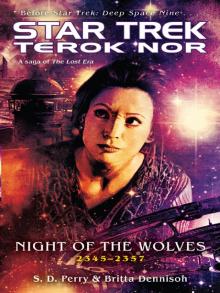 Star Trek: Terok Nor 02: Night of the Wolves
Star Trek: Terok Nor 02: Night of the Wolves